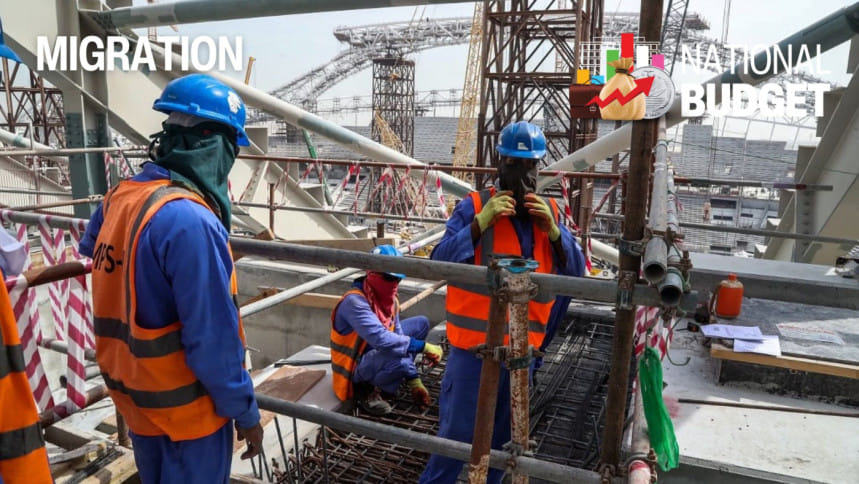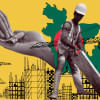Migrant workers overlooked again

The proposed budget for FY2025–26, unveiled today, has drawn criticism for failing to address the long-standing challenges faced by Bangladesh's expatriate workers.
Despite high hopes, the budget did not introduce any new initiatives aimed at improving migrant workers' welfare, standard of living, healthcare, or security.
Nor did it propose any measures to modernise and simplify the remittance-sending process through technology.
There were also no notable steps taken to ensure the safety and protection of women migrant workers --- a group particularly vulnerable to exploitation and abuse abroad.
Given that the new interim government came to power following a student- and mass-led uprising, many migrant workers had expected a people-oriented budget with programmes and incentives targeting their struggles and aspirations.
However, rather than announcing new schemes for migrant welfare, the government largely focussed on increasing the number of outgoing workers through skill development initiatives.
As part of this focus, the government has proposed to strengthen the activities of 70 Technical Training Centres (TTCs) at the district level and 40 TTCs at the upazila level. Additionally, 50 new TTCs are expected to be built in as many upazilas.
Some digitisation steps were mentioned. The government plans to digitalise the departure process for migrant workers, with exit clearance services already introduced in six districts and a plan to expand them nationwide.
A digital complaint submission and redress system will also be launched for deceived workers.
Moreover, the budget includes plans to decentralise the Alternative Dispute Resolution (ADR) mechanism to the district level, delegate the power of dispute resolution to investigating officers, and set up dedicated complaint management cells.
Learning foreign languages and opening more training centres were also reiterated as part of the government's migration strategy.
However, migration experts and rights activists argue that the budget misses the core issues affecting migrant workers.
Notably, the allocation for the Ministry of Expatriates' Welfare and Overseas Employment has been slashed from Tk 1,217 crore last year to Tk 855 crore -- a reduction of Tk 362 crore.
Shariful Hasan, associate director of BRAC's Migration and Youth Initiatives Programme, said migrant workers are facing multi-dimensional hardships, which the budget should have addressed.
"It is ironic that no ray of hope was announced in the budget for expatriate workers," he said.
"The government, this time too, failed to address the woes of migrant workers. There was a need for special allocations --- like those given to the Department of Social Services --- and different schemes and incentives for migrant workers. But this was not reflected in the budget," he added.
Shariful stressed that ensuring migrant worker welfare goes beyond repatriating dead bodies.
"It has become a traditional budget. There is nothing for the welfare of the workers --- nothing to improve their lives, ensure their rights, health, support upon return, or even the safety and security of workers, especially women," he said.
He also criticised the government's approach, saying, "The focus is more on collecting remittances than caring for the migrant workers."
Migration economist Prof Mohammad Jalal Uddin also expressed disappointment over the lack of attention to migrant workers' structural challenges.
"The government did not allocate adequate funds for the betterment of workers. The most important need is to relax structural systems for them," he said.
He noted that even the limited facilities provided through the Wage Earners' Welfare Board come from the workers' own contributions.
"Even the Expatriate Welfare Bank is run with money from expatriate workers. It should be run with government funds, and more money should be allocated to expand its branches across all cities, upazilas --- even rural areas," he added.
Prof Jalal suggested that, if space is a constraint, the government could collaborate with existing banks and rent space to operate smaller-scale branches.
He also called for offering large loans at very low interest rates to failed or returnee migrant workers with minimal documentation.
On the TTCs, he said, "They need to be modernised to create a skilled workforce. A significant portion of the budget should be dedicated to improving these centres for the betterment of migrant workers."
Migrant workers had also hoped that the remittance incentive would be increased in this budget, but it remains unchanged at 2.5 percent.
Many argue that the government must offer a competitive rate to discourage use of the informal hundi system, which still provides higher returns.
Since FY2019–20, the government has been offering a 2 percent incentive on remittances to encourage transfers through formal channels.
This was increased to 2.5 percent in 2022. Currently, for every Tk 100 sent by an expatriate, the recipient receives Tk 102.5 --- the additional Tk 2.5 is subsidised by the government.

 For all latest news, follow The Daily Star's Google News channel.
For all latest news, follow The Daily Star's Google News channel. 








Comments